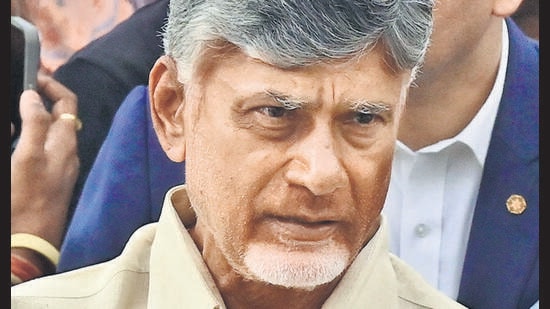The Andhra Pradesh cabinet, chaired by chief minister N Chandrababu Naidu, on Wednesday approved six industrial and investment policies, aimed at encouraging investors to partner with the state for investments and generate 2 million jobs in the next five years.
 ₹50 crore under sub-large category to more than ₹5,000 crore under ultra-mega category with customised incentive scheme. (HT Photo)” title=”CM N Chandrababu Naidu said that the industrial development policy had identified four investment categories with an investment potential ranging from ₹50 crore under sub-large category to more than ₹5,000 crore under ultra-mega category with customised incentive scheme. (HT Photo)” />
₹50 crore under sub-large category to more than ₹5,000 crore under ultra-mega category with customised incentive scheme. (HT Photo)” title=”CM N Chandrababu Naidu said that the industrial development policy had identified four investment categories with an investment potential ranging from ₹50 crore under sub-large category to more than ₹5,000 crore under ultra-mega category with customised incentive scheme. (HT Photo)” />Unveiling the policies at a press conference through a power-point presentation, Naidu said that the policies were an output of comprehensive consultations with industry veterans, benchmarking studies and alignment with election manifesto promises.
The six policies are AP Industrial Development Policy 4.0; AP MSME & Entrepreneur Development Policy 4.0; AP Food Processing Policy 4.0; AP Electronics Policy 4.0; AP Private Parks Policy 4.0 and AP Integrated Clean Energy Policy 4.0.
“We are committed to reigniting the momentum by offering enabling ecosystem and competitive incentives to attract industries back to the state. All the policies are designed to be forward-looking, aiming to boost industrial growth by focusing on job creation, fostering entrepreneurship, addressing climate change, and ultimately generating wealth for the state,” Naidu said.
On industrial development policy, the chief minister said the government was aiming at attracting ₹30 lakh crore in the manufacturing sector with an employment potential of 500,000 jobs, besides attracting a foreign direct investment of US $ 10bn (about ₹83,000 crore) by attracting Fortune 500 companies to the state.
“We have targeted at developing 175 industrial parks with an export potential of ₹33,200 crore,” he said.
Naidu said that the industrial development policy had identified four investment categories with an investment potential ranging from ₹50 crore under sub-large category to more than ₹5,000 crore under ultra-mega category with customized incentive scheme.
“Companies promising higher employments will be offered up to 10% higher incentives and those focusing in reducing carbon footprint are incentivised with de-carb subsidy up to 6%,” he said.
With regard to MSME & Entrepreneur Development Policy, Naidu said the government would encourage one entrepreneur from one family in the next five years. “It is aimed at attracting an investment of ₹50,000 crore in the manufacturing sector by encouraging 2.2 million MSME (medium, small and major enterprises) units under manufacturing and services sectors, that would generate 500,000 jobs.
Naidu announced the establishment of Rata Tata Innovation Hub with its headquarters at Amaravati having five zonal centres covering all regions of the state for entrepreneur development. It would focus on mentoring, venture capital tie-ups, financial support, knowledge transmission, legal aid and integration with universities led by leading industry groups.
“This innovation hub will be set up with a corpus fund of ₹500 crore to be spent in the next five years and it will bring new and existing entrepreneurs under one roof. It will support quality production and adherence to global standards, besides helping them market domestic manufactured products.
Under AP Food Processing policy, Naidu said the government was aiming at attracting ₹30,000 crore in the manufacturing sector with a potential of creating 300,000 jobs. It would ensure exports to the tune of US $ 15bn, he said.
As per the policy, the government would notify three tribal districts as organic zones and establish commodity boards for mango, banana and cashew plantations. They would utilise a corpus fund of ₹250 crore for research and development in food processing technology and quality certification, he said.
With regard to AP Electronics Manufacturing Policy, the chief minister said the policy targeted attracting investment of ₹84,000 crore from all electronic categories in the next five years and generate employment of five lakh. The policy was aiming at producing IT products to the tune of ₹4.2 lakh crore.
As regards AP Private Industrial Parks policy, Naidu said the government would encourage establishment of industrial parks with private participation, along with the three industrial corridors with world-class infrastructure with plug and play facilities.
Under the policy, it is envisaged to create following sector-specific parks, including aqua, agri and horticulture processing, biotechnology, defence and aerospace, drone manufacturing, electric vehicles (EV), gems and jewellery, leather and footwear, pharmaceutical, semiconductor and electronics and textiles.
















